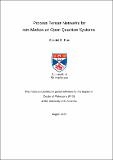Files in this item
Process tensor networks for non-Markovian open quantum systems
Item metadata
| dc.contributor.advisor | Keeling, Jonathan Mark James | |
| dc.contributor.advisor | Lovett, Brendon W. | |
| dc.contributor.author | Fux, Gerald E. | |
| dc.coverage.spatial | 81 | en_US |
| dc.date.accessioned | 2023-02-03T17:33:06Z | |
| dc.date.available | 2023-02-03T17:33:06Z | |
| dc.date.issued | 2022-11-29 | |
| dc.identifier.uri | https://hdl.handle.net/10023/26902 | |
| dc.description.abstract | The advance of quantum technology relies heavily on an accurate understanding of the unavoidable interactions between quantum systems and their environment. While it is often adequate to account for the environment using approximate time-local (i.e. Markovian) equations of motion, in many scenarios such a description fails, and a more general non-Markovian theory becomes necessary. The failure of Markovian descriptions concerns not only quantitative aspects of the reduced dynamics of a quantum system, but also qualitative and conceptual aspects, such as the failure of the quantum regression formula relating the system's dynamics to its multi-time correlations. Despite considerable progress in recent years, the description and simulation of non-Markovian open quantum systems remains a conceptual and computational challenge. In this thesis we develop a versatile set of numerical methods for non-Markovian open quantum systems by combining the so-called process tensor framework with the numerical power of tensor network methods. The recently introduced process tensor is an alternative approach to open quantum systems and is - unlike the canonical approach based on dynamical maps - well suited for a rigorous characterisation of non-Markovian open quantum systems. We construct and apply process tensors in a matrix product operator form (PT-MPO) to yield a numerically exact, yet efficient representation of non-Markovian open quantum systems, which allows for a variety of practical applications. Building on the PT-MPO we introduce general methods to (1) efficiently find optimal control procedures for non-Markovian open quantum systems, (2) compute the dynamics and multi-time correlations of chains of non-Markovian open quantum systems, and (3) construct a time-translational invariant PT-MPO, which allows efficient computation of steady states even in non-equilibrium non-Markovian scenarios. | en_US |
| dc.language.iso | en | en_US |
| dc.rights | Creative Commons Attribution 4.0 International | * |
| dc.rights.uri | http://creativecommons.org/licenses/by/4.0/ | * |
| dc.subject | Open quantum systems | en_US |
| dc.subject | Tensor networks | en_US |
| dc.subject | Non-Markovian | en_US |
| dc.subject | Optimal control | en_US |
| dc.subject | Multi-time correlations | en_US |
| dc.subject | Many-body problem | en_US |
| dc.title | Process tensor networks for non-Markovian open quantum systems | en_US |
| dc.type | Thesis | en_US |
| dc.contributor.sponsor | Engineering and Physical Sciences Research Council (EPSRC) | en_US |
| dc.type.qualificationlevel | Doctoral | en_US |
| dc.type.qualificationname | PhD Doctor of Philosophy | en_US |
| dc.publisher.institution | The University of St Andrews | en_US |
| dc.identifier.doi | https://doi.org/10.17630/sta/259 | |
| dc.identifier.grantnumber | EP/L015110/1 | en_US |
The following licence files are associated with this item:
This item appears in the following Collection(s)
Except where otherwise noted within the work, this item's licence for re-use is described as Creative Commons Attribution 4.0 International
Items in the St Andrews Research Repository are protected by copyright, with all rights reserved, unless otherwise indicated.


